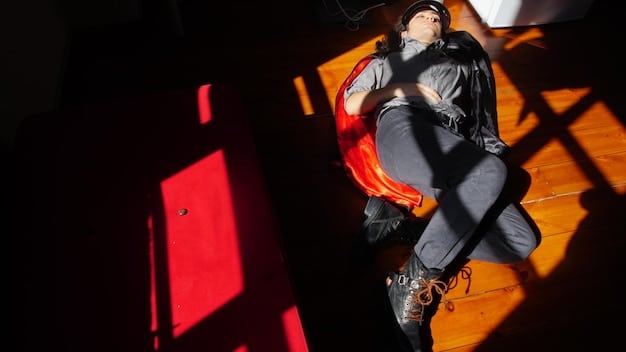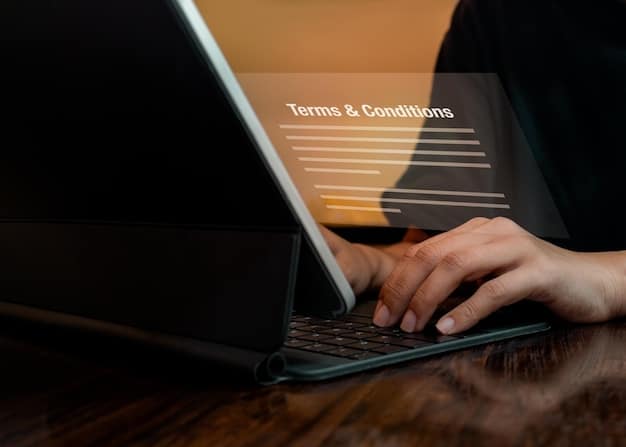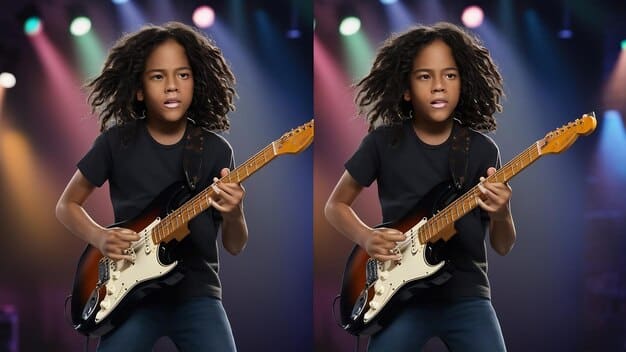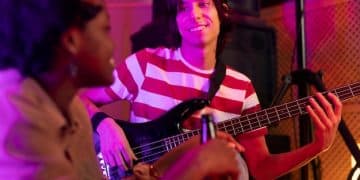Copyright Law Updates: Protecting Your Rap Music in the Digital Age

Copyright law updates necessitate vigilance in the digital age, particularly for protecting underground rap music, which requires understanding evolving legal frameworks and proactive measures to safeguard creative works.
The digital landscape presents unique challenges for underground rap artists seeking to protect their creative work. Keeping abreast of copyright law updates is crucial for navigating these complexities and ensuring their rights are safeguarded.
Understanding Copyright Basics for Musicians
Copyright law forms the cornerstone of protecting intellectual property, and for musicians, especially those in the underground rap scene, understanding its basics is essential. This knowledge helps them navigate the legal landscape and safeguard their creative works.
What Copyright Protects
Copyright protects original works of authorship, including musical compositions and sound recordings. This means that both the lyrics and the music, as well as the recorded performance, are eligible for copyright protection.
Duration of Copyright Protection
In the United States, copyright protection generally lasts for the life of the author plus 70 years. For works made for hire, the copyright lasts for 95 years from publication or 120 years from creation, whichever is shorter.
- Registering your work with the U.S. Copyright Office creates a public record of your copyright claim.
- Copyright protection is automatic upon creation, but registration provides significant legal advantages.
- Registration allows you to sue for infringement and claim statutory damages and attorney’s fees.
Understanding these fundamental aspects of copyright law is the first step in protecting your music and ensuring that you receive due credit and compensation for your creative efforts. By being proactive and informed, underground rap artists can navigate the legal complexities of the music industry with confidence.
Navigating Digital Platforms and Streaming Services
Digital platforms and streaming services have revolutionized the music industry, offering unprecedented opportunities for underground rap artists to share their work globally. However, these platforms also introduce new challenges related to copyright and intellectual property protection.
Terms of Service and Copyright
Before uploading your music to any digital platform or streaming service, it’s crucial to carefully review their terms of service. These terms often outline how your music will be used, distributed, and monetized, as well as the platform’s policies on copyright infringement.
Content ID Systems and Copyright Enforcement
Many platforms employ content ID systems to detect and prevent copyright infringement. These systems scan uploaded content for matches to copyrighted material, and if a match is found, the platform may take action, such as removing the infringing content or directing royalties to the copyright holder.

- Familiarize yourself with the platform’s content ID system and how it handles copyright disputes.
- Regularly monitor your music on these platforms to identify and address any instances of infringement.
- Keep accurate records of your music, including copyright registration information and licensing agreements.
Navigating the digital landscape requires vigilance and a proactive approach to copyright protection. By understanding the terms of service, utilizing content ID systems, and closely monitoring your music, underground rap artists can safeguard their rights and ensure they are fairly compensated for their creative work.
Protecting Your Music from Copyright Infringement
Copyright infringement, the unauthorized use of copyrighted material, remains a significant concern for musicians. Underground rap artists need to be proactive in protecting their music from infringement and enforcing their rights when it occurs.
Identifying Copyright Infringement
Keep an eye out for unauthorized uses of your music online and offline. This may include illegal downloads, unauthorized streaming, and use of your music in videos or other media without permission. Utilize tools like Google Alerts and specialized copyright monitoring services to track potential infringements.
Taking Action Against Infringers
If you discover copyright infringement, take prompt action. This may involve sending a cease and desist letter to the infringer, filing a takedown notice with the infringing platform, or pursuing legal action in court. Consult with a copyright attorney to determine the best course of action.
One of the first steps you can take is to send a DMCA (Digital Millennium Copyright Act) takedown notice to the website or platform hosting the infringing content. This notice requests the platform to remove the infringing material promptly.
- Document all instances of infringement, including dates, locations, and evidence of unauthorized use.
- Contact the infringer directly and demand that they cease using your music without permission.
- Be prepared to take legal action if the infringer fails to comply with your demands.
Protecting your music from copyright infringement requires vigilance, proactive monitoring, and a willingness to enforce your rights. By taking these steps, underground rap artists can deter infringement and ensure that their creative work is respected and protected.
Fair Use and Sampling Considerations
Fair use is a legal doctrine that allows limited use of copyrighted material without permission from the copyright holder. Sampling, a common practice in rap music, often raises fair use issues, and understanding these considerations is crucial for underground rap artists.
Understanding the Fair Use Doctrine
The fair use doctrine allows for the use of copyrighted material for purposes such as criticism, commentary, news reporting, teaching, scholarship, and research. Courts consider four factors when determining whether a particular use is fair:
Sampling Legally and Ethically
If you plan to use samples in your music, obtain permission from the copyright holder whenever possible. Clearances can be time-consuming and expensive, but they ensure that you are using the sampled material legally and ethically. Explore alternative options such as using royalty-free samples or creating your own original sounds.

- The purpose and character of the use, including whether such use is of a commercial nature or is for nonprofit educational purposes.
- The nature of the copyrighted work.
- The amount and substantiality of the portion used in relation to the copyrighted work as a whole.
- The effect of the use upon the potential market for or value of the copyrighted work.
Navigating fair use and sampling requires a nuanced understanding of copyright law and ethical considerations. By being informed and proactive, underground rap artists can minimize the risk of infringement and ensure that their music is legally compliant.
Registering Your Copyrights: A Step-by-Step Guide
Registering your copyrights with the U.S. Copyright Office provides valuable legal protection for your music. While copyright protection is automatic upon creation, registration offers significant advantages, including the ability to sue for infringement and claim statutory damages and attorney’s fees.
Preparing Your Application
Gather all necessary information and materials before starting the registration process. This includes the title of your work, the author’s name, the date of creation, and a copy of the music you are registering.
Submitting Your Application Online
The U.S. Copyright Office offers an online registration system that allows you to submit your application electronically. Create an account, complete the online form, and upload your music files. Pay the required registration fee, which varies depending on the type of work being registered.
- Visit the U.S. Copyright Office website (www.copyright.gov) to access the online registration system.
- Follow the instructions carefully and provide accurate information.
- Keep a record of your registration confirmation and the date of registration.
Registering your copyrights is a straightforward process that provides valuable legal protection for your music. By taking the time to register your works, underground rap artists can safeguard their rights and ensure they are able to enforce them in case of infringement.
Monetizing Your Music While Protecting Your Rights
Monetizing your music is crucial for sustaining your career as an underground rap artist. However, it’s equally important to protect your rights and ensure that you are fairly compensated for your creative work.
Licensing Your Music
Licensing your music allows others to use it in exchange for royalties or fees. There are various types of licenses, including performance licenses, mechanical licenses, and synchronization licenses. Consider joining a performing rights organization (PRO) such as ASCAP or BMI to collect royalties for public performances of your music.
Selling Your Music Online
Sell your music directly to fans through online platforms such as Bandcamp, CD Baby, or your own website. This allows you to retain a larger share of the revenue and maintain control over your music’s distribution.
- Explore different revenue streams, such as streaming royalties, digital downloads, merchandise sales, and live performances.
- Negotiate fair contracts with labels, publishers, and distributors.
- Protect your brand by registering trademarks for your artist name and logo.
Monetizing your music requires a strategic approach that balances financial gain with copyright protection. By licensing your music, selling it directly to fans, and exploring diverse revenue streams, underground rap artists can build sustainable careers while safeguarding their rights.
| Key Point | Brief Description |
|---|---|
| 📝 Copyright Basics | Understand what copyright protects: musical compositions and sound recordings. |
| 🛡️ Infringement | Monitor and act against unauthorized uses of your music online and offline. |
| 🎵 Fair Use | Be aware of fair use when sampling; obtain permissions when possible. |
| 💼 Monetization | License your music and sell directly to fans to retain control and revenues. |
Frequently Asked Questions (FAQ)
Copyright protects your original musical compositions and their sound recordings. This includes both the lyrics and the melody of your raps and how they are recorded.
You can register your music online through the U.S. Copyright Office website. Fill out the application, upload a copy of your work, and pay the necessary fee.
First, document the infringement. Then, send a cease and desist letter to the infringer. If they don’t comply, consider legal action with the help of a copyright attorney.
Fair use allows limited use of copyrighted material without permission for purposes like criticism, commentary, or education. It’s determined by a four-factor test.
License your music through PROs like ASCAP or BMI, sell directly to fans on platforms like Bandcamp, and negotiate fair contracts with labels and publishers.
Conclusion
Navigating the complexities of copyright law in the digital age is essential for underground rap artists. By understanding copyright basics, protecting their music from infringement, and exploring monetization strategies, artists can safeguard their creative work and build sustainable careers.





